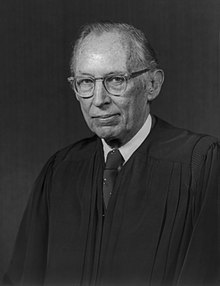Lewis Powell, Jr.
| Lewis F. Powell Jr. | |
|---|---|
 |
|
| Associate Justice of the Supreme Court of the United States | |
|
In office January 7, 1972 – June 26, 1987 |
|
| Nominated by | Richard Nixon |
| Preceded by | Hugo Black |
| Succeeded by | Anthony Kennedy |
| Personal details | |
| Born |
Lewis Franklin Powell Jr. September 19, 1907 Suffolk, Virginia, U.S. |
| Died | August 25, 1998 (aged 90) Richmond, Virginia, U.S. |
| Political party | Democratic |
| Education |
Washington and Lee University (BS, LLB) Harvard University (LLM) |
| Military service | |
| Allegiance |
|
| Service/branch |
|
| Years of service | 1942–1945 |
| Battles/wars | World War II |
Lewis Franklin Powell Jr. (September 19, 1907 – August 25, 1998) was an Associate Justice of the Supreme Court of the United States, serving from 1971 to 1987. Powell compiled a conservative record on the Court and cultivated a reputation as a swing vote with a penchant for compromise.
Born in Suffolk, Virginia, he graduated from Harvard Law School and served in the United States Army Air Forces during World War II. He worked for a large law firm in Richmond, Virginia, focusing on corporate law and representing clients such as the Tobacco Institute. In 1971, President Richard Nixon appointed Powell to succeed Associate Justice Hugo Black. He retired from the Court during the administration of President Ronald Reagan, and was succeeded by Anthony Kennedy.
His tenure largely overlapped with that of Chief Justice Warren Burger, and Powell was often a key swing vote on the Burger Court. His majority opinions include First National Bank of Boston v. Bellotti and McCleskey v. Kemp, and he wrote an influential opinion in Regents of the University of California v. Bakke. He notably joined the majority in cases such as United States v. Nixon, Roe v. Wade, Plyler v. Doe, and Bowers v. Hardwick.
...
Wikipedia
